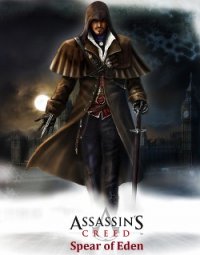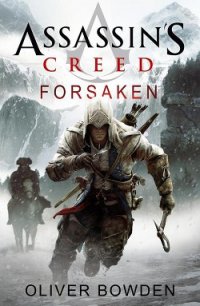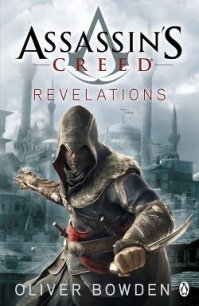Assassin's creed : Black flag - Bowden Oliver (библиотека книг .txt) 📗
What was I to do? Carry it around and keep trying? Hope I’d eventually chance upon its secret? Somehow I thought not. I had the feeling there was arcane knowledge attached to this blade. Found upon me, it could betray me.
With a heavy heart I cast it away, then addressed the grave-side I had prepared for my victim.
“Mr. Walpole . . .” I said, “let’s collect your reward.”
TWENTY-FOUR
I came upon them at Cape Buena Vista beach the next morning: a schooner anchored in the harbour, boats brought ashore and crates off-loaded and dragged onto the beach where they’d been stacked, either by the dejected-looking men who sat on the sand with their hands bound, or perhaps by the bored English soldiers who stood guard over them. As I arrived, a third boat was docking, more soldiers disembarking and casting their eyes over the prisoners.
Why the men were tied up, I wasn’t sure. They certainly didn’t appear to be pirates. Merchants by the looks of them. Either way, as another rowing-boat approached I was about to find out.
“The commodore’s gone ahead to Kingston,” called one of the soldiers. In common with the others he wore a tricorn and waistcoat and carried a musket. “We are to commandeer this lubber’s ship and follow.”
So that was it. The English wanted their ship. They were as bad as pirates themselves.
Merchants like to eat almost as much as they like to drink. Thus they tend towards the stout side. One of the captives, however, was even more florid-faced and plump than his companions. This was the “lubber” the English were talking about, the man I came to know as Stede Bonnet, and at the sound of the word “Kingston,” he’d seemed to perk up, and he raised his head, which before had been contemplating the sand with the look of a man wondering how he’d got into this position and how he was going to get out.
“No, no,” he was saying, “our destination is Havana. I’m just a merchant . . .”
“Quiet, you bloody pirate!” An irate soldier responded by toeing sand into the wretched man’s face.
“Sir”—he cringed—“my crew and I have merely anchored to water and resupply.”
Then, for some reason known only to them, Stede Bonnet’s companions chose that moment to make their escape. Or try to make their escape. Hands still tied, they scrambled to their feet and began a lurching run towards the tree line where I hid, watching the scene. At the same time the soldiers, seeing their escape, raised their muskets.
Shot began zinging into the trees around me and I saw one of the merchants fall in a spray of blood and brain matter. Another went down heavily with a scream. Meanwhile, one of the soldiers had placed the muzzle of his rifle at Bonnet’s head.
“Give me one reason I shouldn’t vent your skull,” he snarled.
Poor old Bonnet, accused of being a pirate, about to lose his ship, and seconds away from a steel ball in the brain. He did the only thing a man in his position could do. He stammered. He spluttered. Possibly even wet himself.
“Um . . . um . . .”
I drew my cutlass and emerged from the tree line with the sun behind me. The soldier gaped. What I must have looked like as I stepped out of the glare of the sunshine with my robes flowing and cutlass swinging I don’t know, but it was enough to give the rifleman pause a second. A second that cost him his life.
I slashed upwards, opening his waistcoat and spilling his guts to the sand, spinning around in the same movement and dragging my blade across the throat of a soldier who stood nearby. Two men dead in the blink of an eye and a third about to join them as I ran him through with my cutlass. And he slid from my blade and died, writhing on the beach. I snatched my dagger from my belt with my other hand, jammed it into the eye of a fourth, and he fell back with a shocked yell, blood gushing from the hilt embedded in his face, staining the teeth of his screaming mouth.
The soldiers had all loosed their shot at the escaping merchants, and though they weren’t slow to reload, were still no match for a swordsman. That’s the thing with soldiers of the Crown. They rely too much on their muskets, great for frightening native women, not so effective at close quarters with a scrapper who learnt his trade in the taverns of Bristol.
The next man was still bringing his musket to bear when I dispatched him with two decisive strokes. The last of the soldiers was the first to get a second shot off. I heard it part the air by my nose and reacted with shock, hacking at his arm wildly until his musket dropped and he fell to his knees, pleading for his life with a raised hand until I silenced him with the point of my cutlass into his throat. He dropped with a gurgle, his blood flooded the sand around him, and I stood over his body with my shoulders heaving as I caught my breath, hot in my robes but knowing I had handled myself well. When Bonnet thanked me, saying, “By God’s grace, sir, you saved me. A profusion of thanks!” it wasn’t Edward Kenway the farm-boy from Bristol he was thanking. I had started again. I had become Duncan Walpole.
• • •
Stede Bonnet, it turned out, had not only lost his crew but had no skill for sailing. I had saved his ship from being commandeered by the English but to all intents and purposes I commandeered it myself. We had one thing in common, at least, as we were both heading for Havana. His ship was fast and he was talkative but good company, so we sailed together in what was a mutually beneficial partnership—for the time being at least.
As I steered I asked him about himself. What I found was a rich but fretful man, evidently attracted to more, shall we say, questionable ways of making even more money. For one thing, he constantly asked about pirates.
“Most hunt the Windward Passage between Cuba and Hispaniola,” I told him, suppressing a smile as I steered his schooner.
He added, “I shouldn’t worry about being waylaid by pirates, truth be told. My ship is small and I have nothing of immense value. Sugar-cane and its yields. Molasses, rum, that sort of thing.”
I laughed, thinking of my own crew. “There’s not a pirate living who’d turn his back on a keg of rum.”
Havana was a low port surrounded by green forest and tall palm trees, their fronds a lush green that wafted gently in the breeze, waving us in as our schooner sailed into port. In the busy town, white-stone buildings with red-slate roofs looked dilapidated and weather-beaten, bleached by the sun and blasted by the wind.
We moored and Bonnet set about his business helping to maintain amicable links with our former enemies the Spanish. He did it using that venerable diplomacy technique—selling them things.
He seemed to know the city, so rather than strike out alone I waited for his diplomacy mission to end, then agreed to accompany him to an inn. As we made our way there it occurred to me—the old me, the Edward Kenway–me—would have been looking forward to reaching the tavern. He’d have been getting thirsty.
But I had no urge to drink—and I mulled that over as we made our way through Havana, weaving through townsfolk who hurried along the sun-drenched streets, and watched by suspicious old folk who squinted at us from doorways. All I’d done was assume a different name and clothes, but it was as though I had been given a second chance at becoming . . . well . . . a man. As if Edward Kenway was a rehearsal from which I could learn my mistakes. Duncan Walpole would be the man I always wanted to be.
We reached the inn. The taverns of Edward’s past had been dark places with low ceilings and shadows that leapt and danced on the walls, where men hunched over tankards and spoke from the sides of their mouths. Here beneath the Cuban sun twinkled an outdoor tavern crowded with sailors who were leathery-faced and sinewy from months at sea, as well as portly merchants—friends of Bonnet, of course—and locals: men and children with handfuls of fruit for sale, women trying to sell themselves.




